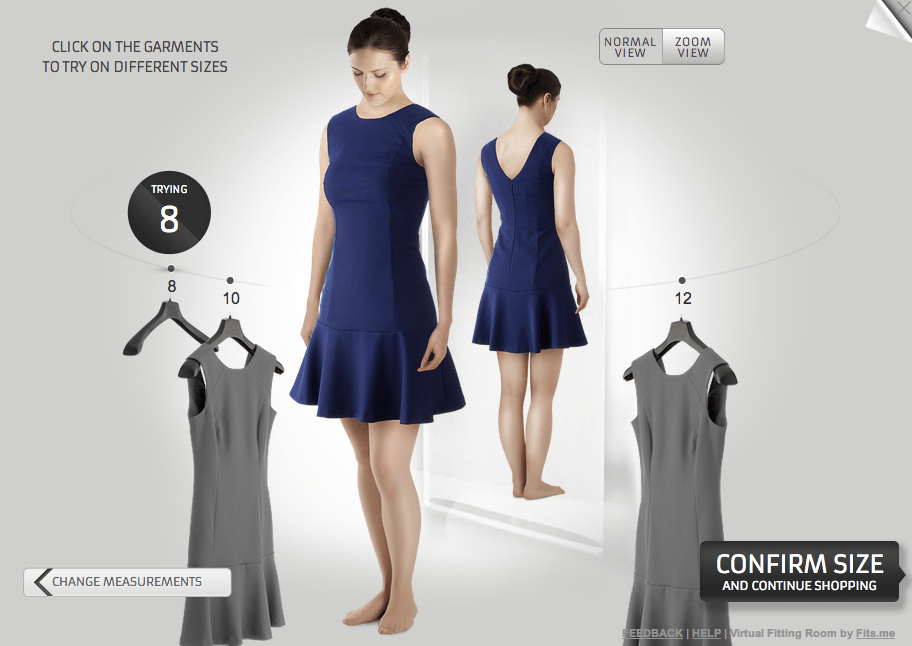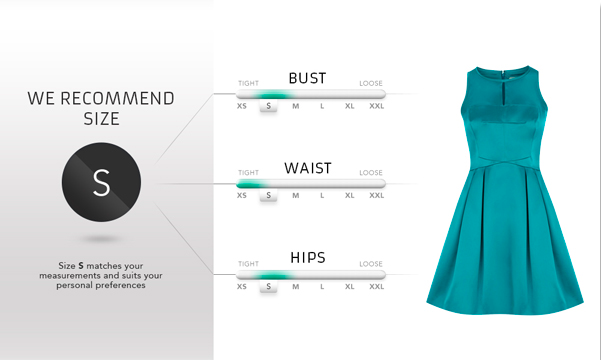Try-for-size-before-you buy virtual fitting room startup Fits.me has closed a €5.5 million ($7.2 million) Series A round. It’s not all new money — we covered the first €1.5 million tranche, back in January 2012 — but the startup has now added €4 million to complete the round. Backers include existing investor SmartCap, plus new participation from Conor Venture Partners, Fostergate Holdings Ltd and The Entrepreneurs Fund.
Commenting on the Series A round, in a supporting statement, Conor Venture Partners’ Manu Mäkelä said: “Fits.me has a sophisticated solution that works, delivers provable results, is easy for retailers to deploy and has been signed up by a growing band of respected retailers and brands, on an international basis. From an investor’s point of view, there is tremendous growth potential.”
We first wrote about the Estonian startup, which is based in London, back in 2010 when it closed a seed/early-stage/grant funding round (not its Series B, as we reported then). That early-stage funding — totalling €2.6 million — also came in two tranches, dating back to May 2009 and August 2010. All told, Fits.me has raised just over €8 million ($10.5 million) in just under four years. Customers for its clothing fit recommendation SaaS to date include Adidas, Avenue32, Barbour By Mail, Boden, Ermenegildo Zegna, Hawes & Curtis, Henri Lloyd, Hugo Boss, John Smedley, L.K.Bennett, Mexx, Nicole Farhi, Otto, Pretty Green, Superdry and Thomas Pink.
With its latest funding round in the bank, Fits.me told TechCrunch it is preparing to “aggressively expand” throughout Europe (it currently has offices in Munich and Paris, as well as London), and to scale up capacity to support its expansion plans. It is also planning for “a major push into markets outside Europe” — including the U.S. — and is in the process of opening a New York office to kick things off across the pond. A likely U.S. launch timeframe is towards the end of the year, after which it will be looking to raise a Series B round.
Fits.me is one of a raft of startups trying to oil the wheels of online clothes retailers by making it easier for buyers to figure out what fits and suits them before they click to buy. Returns are a huge cost sink for sartorial e-tailers — Fits.me describes clothes returns as a “£7.4 billion problem globally” — so the size of the business opportunity has encouraged scores of startups to try their luck at fixing the disconnect between what a shopper thinks will fit them and what actually fits.
Fits.me names its main competitors in the space as Virtusize, True Fit, Metail and Clothes Horse — but there are lots more. Another — Fitiquette — was recently acquired by Indian e-commerce company Myntra. But although it’s sitting in a crowded market, Fits.me doesn’t sound like it’s preparing for an exit. Co-founder Heikki Haldre is bullish about its prospects and dismissive of the competitive landscape — pointing to Fits.me’s ability to offer not just size recommendations but also style preference by allowing users to select a snug, regular or loose fit option across various body parts. 
“On the fitting room, we are the only solution that can provide the retailers and the customers alike the visual information — how the clothing fits. There’s no other solution in the market,” he told TechCrunch. “Fits.me today is commercially the only successful solution that does address [the high number of clothes returns online] and resolves this for the clothing online retailers.”
Fits.me has developed two products to sell to retailers. Its high-end Virtual Fitting Room offering users robot mannequins that can be adjusted to take on different body shapes and sizes. The mannequins are then dressed in each garment and thousands of photographs are taken so that shoppers with corresponding body measurements can see a visualisation of a garment’s fit displayed on a virtual model.
This system requires users to enter a set of body measurements in order to pull up the correct images from Fits.me’s database. And with 1,500 to 2,500 photographs required per garment — and a cost that’s in the “mid to low £100s” to capture all the data required for one garment in all its size permutations — it’s not cost effective for every type of garment or scalable for every fashion retailer. Fast fashion mass market retailers, for example, who opt to sell a lot of garments quickly and at relatively low cost with a high turnover of stock and styles, may not look like obvious Fits.me customers. (Its current customer list certainly looks weighted towards prestige/small collection brands.)
To bridge the scalability and cost gap, Fits.me has developed a second lower cost, photography-free system, called Fit Advisor (pictured below). Instead of visualising the clothes on a virtual model, it advises the user which size to buy by comparing their body measurements to measurements taken directly from the clothes. The availability of that data varies by retailer, it said, with retailers generally likely to be able to most easily procure measurements from any own brand clothing lines they stock.
Fits.me said Fit Advisor is mostly being used in combination with its Virtual Fitting Room tech, with a retailer offering a portion of their garments within the virtual fitting room, but other (perhaps less expensive) items having only its measurement matching system.
“The majority of clients will be using Fit Adviser in conjunction with the Virtual Fitting Room,” said Fit.me’s VP of sales, Pete Rankin. “A lot of our clients have got ratios of say 10% of their product equals 90% of their sales. Or down to 30%: 70% and we’ve focused the photographic version on those best sellers and worst returners, and then the long tail products we would then supplement with the Fit Advisor. Only one client so far has signed up for just the Fit Advisor.”
Another way Fits.me can lower the cost of its SaaS to retailers is by aggregating garments that have the same sizing to reduce photography/processing costs, it added.
On the performance front, for the “normally” 15%-20% of website users who opt to use its Virtual Fitting Room tech, Rankin said its “benchmark” data shows a doubling of the retailer’s conversation rate, while the returns rate for these same users is divided by 2.5. It added that individual retailer performance can be better than the benchmark — with Pretty Green, for instance, reducing its overall returns rate from 13% to 3%.
Although it’s currently relying on users to input their body measurements, Fits.me said it has a “technology agnostic” philosophy to capturing sizing data, suggesting that it could be open to using other technologies to do this in future. It cited rivals using web cams to capture body shape as an example of a type of tech that it believes is not currently accurate enough for it to be “comfortable” using it, but which it could look to incorporate down the line if the tech improves.
The unspoken implication here is that Fits.me could be looking to gobble up some of its rivals — when or if their technology becomes interesting enough. “At this time we’re looking at a number of different ways of increasing the solutions from our fit and sizing platform,” said Rankin, declining to comment further when asked whether it is looking to make any acquisitions.
Looking beyond the problem of size and fit for online retailers, a possible future additional revenue stream for the business, once it has ramped up and gathered more sizing data, could come from monetising its database of body measurements in another way: by selling information about body size and fit preferences back to clothes-makers to help them make more saleable clothes. (What you could describer as ‘big, medium and small data’.)
“Looking to a little bit longer term, as far as I know Fits.me is also the world’s largest database of human body measurements and fit preferences. Now when we are resolving the biggest problem for the clothing ecommerce, the data that we’re collecting helps the clothing manufacturers, clothing brands start producing clothing that fits more people not just in online channels, but also in brick and mortar sales. So Fits.me has quite an impact,” Haldre told TechCrunch.
“Virtual fitting room itself is quite sizeable business — we’re talking a million forecasted bookings — however I do believe our next step is the data business which will be even significantly bigger.”
































Comment